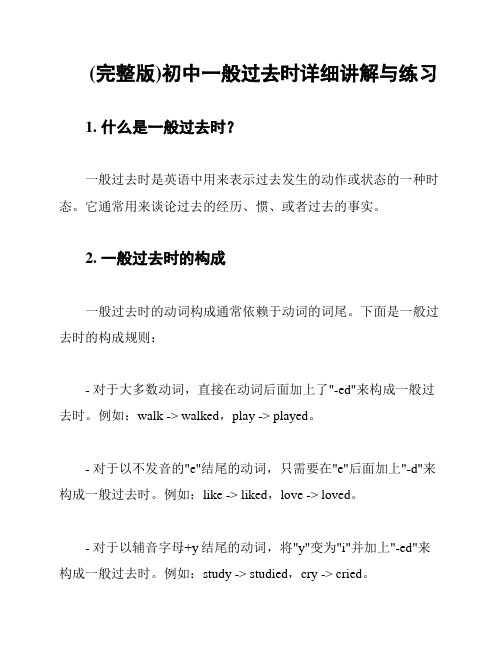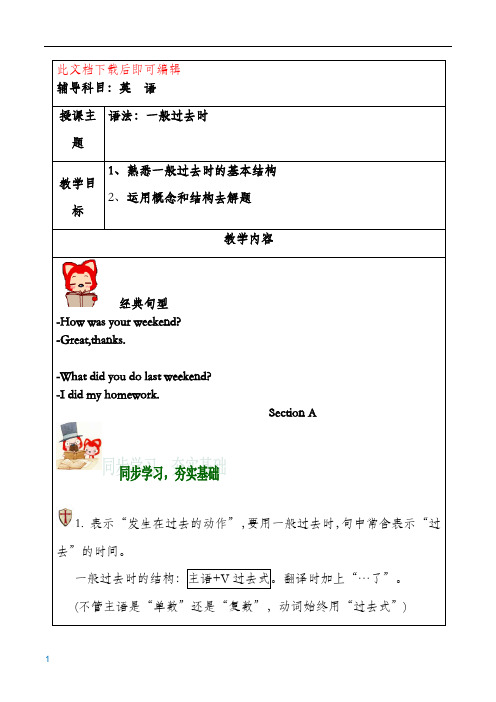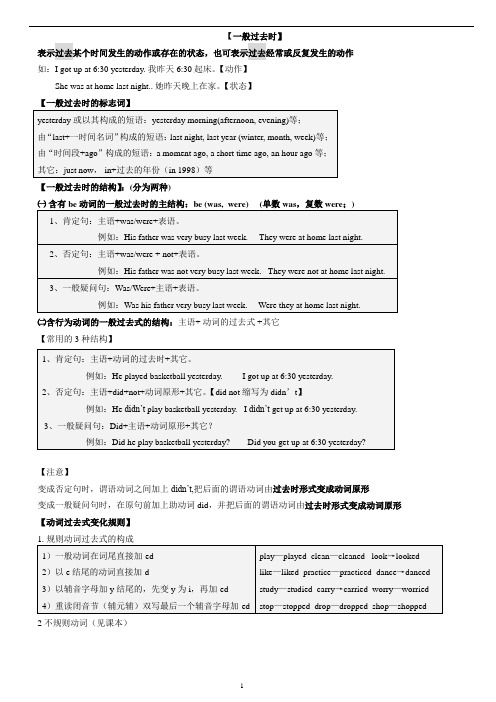(完整word版)七年级下册一般过去时讲解及练习题
(完整word版)初一下一般过去时讲解及训练

初一过去时讲解及训练一般过去时1.一般过去时表示过去某个时间发生的动作或存在的状态,常和表示过去的时间状语连用。
一般过去时也表示过去经常或反复发生的动作。
常用过去时间:yesterday, this morning, just now, a moment ago, in May, last night / year / week, once upon a time, the other day, before …, when –clause, in the past连用。
如:What did you do yesterday? 昨天你干了什么?I met Lin Tao this morning. 今天上午我会到了林涛。
I was there a moment ago. 刚才我在那儿2.Be动词在一般过去时中的变化:⑴am 和is在一般过去时中变为was。
(was not=wasn't)⑵are在一般过去时中变为were。
(were not=weren't)⑶带有was或were的句子,其否定、疑问的变化和is, am, are一样,即否定句在was或were后加not,一般疑问句把was或were调到句首。
3.句中没有be动词的一般过去时的句子肯定句:Jim went home yesterday.把动词改为过去形式否定句:didn't +动词原形,如:Jim went home yesterday.Jim didn't go home yesterday.一般疑问句:在句首加did,句子中的动词过去式变回原形。
如:Jim went home yesterday.Did Jim go home yesterday?特殊疑问句:⑴疑问词+一般疑问句?如:Jim went home yesterday.Did Jim go home yesterday?What did Jim do yesterday?动词过去式变化规则:(1) 一般在动词后加-ed。
(完整版)初中一般过去时详细讲解与练习

(完整版)初中一般过去时详细讲解与练习1. 什么是一般过去时?一般过去时是英语中用来表示过去发生的动作或状态的一种时态。
它通常用来谈论过去的经历、惯、或者过去的事实。
2. 一般过去时的构成一般过去时的动词构成通常依赖于动词的词尾。
下面是一般过去时的构成规则:- 对于大多数动词,直接在动词后面加上了"-ed"来构成一般过去时。
例如:walk -> walked,play -> played。
- 对于以不发音的"e"结尾的动词,只需要在"e"后面加上"-d"来构成一般过去时。
例如:like -> liked,love -> loved。
- 对于以辅音字母+y结尾的动词,将"y"变为"i"并加上"-ed"来构成一般过去时。
例如:study -> studied,cry -> cried。
- 部分动词的一般过去时需要进行不规则变化。
例如:go -> went,eat -> ate。
3. 一般过去时的用法一般过去时通常用来描述以下情况:- 过去发生的动作:I walked to school yesterday.- 过去的经历:He lived in London for five years.- 过去的事实:She was a teacher in the past.4. 一般过去时的句型练下面是一些练,帮助加深对一般过去时的理解和运用:1. 请用一般过去时填空:Yesterday, I ________ (watch) a movie at home.2. 完成句子:He _____ (visit) his grandparents last summer.3. 改写句子,使用一般过去时:I read a book yesterday. (改为否定句)4. 改写句子,使用一般过去时:They played basketball in the park. (改为疑问句)5. 总结一般过去时是用来表示过去发生的动作或状态的一种时态。
初一下一般过去时讲解及训练(2021年整理)

初一下一般过去时讲解及训练(word版可编辑修改)编辑整理:尊敬的读者朋友们:这里是精品文档编辑中心,本文档内容是由我和我的同事精心编辑整理后发布的,发布之前我们对文中内容进行仔细校对,但是难免会有疏漏的地方,但是任然希望(初一下一般过去时讲解及训练(word版可编辑修改))的内容能够给您的工作和学习带来便利。
同时也真诚的希望收到您的建议和反馈,这将是我们进步的源泉,前进的动力。
本文可编辑可修改,如果觉得对您有帮助请收藏以便随时查阅,最后祝您生活愉快业绩进步,以下为初一下一般过去时讲解及训练(word版可编辑修改)的全部内容。
初一过去时讲解及训练一般过去时1.一般过去时表示过去某个时间发生的动作或存在的状态,常和表示过去的时间状语连用。
一般过去时也表示过去经常或反复发生的动作。
常用过去时间:yesterday, this morning, just now, a moment ago, in May, last night / year / week, once upon a time, the other day, before …, when –clause, in the past连用。
如:What did you do yesterday?昨天你干了什么?I met Lin Tao this morning. 今天上午我会到了林涛.I was there a moment ago。
刚才我在那儿2.Be动词在一般过去时中的变化:⑴am 和is在一般过去时中变为was。
(was not=wasn’t)⑵are在一般过去时中变为were。
(were not=weren’t)⑶带有was或were的句子,其否定、疑问的变化和is, am, are一样,即否定句在was或were后加not,一般疑问句把was或were调到句首.3.句中没有be动词的一般过去时的句子肯定句:Jim went home yesterday。
七年级下册一般过去时讲解及练习题(完整资料).doc

此文档下载后即可编辑辅导科目:英语授课主题语法:一般过去时教学目标1、熟悉一般过去时的基本结构2、运用概念和结构去解题教学内容经典句型-How was your weekend?-Great,thanks.-What did you do last weekend?-I did my homework.Section A1. 表示“发生在过去的动作”,要用一般过去时,句中常含表示“过去”的时间。
一般过去时的结构:主语+V过去式。
翻译时加上“…了”。
(不管主语是“单数”还是“复数”,动词始终用“过去式”)练:(1) He _________ (go) to school on foot yesterday.(2) – What did Jim do?-- He _________ (go) to the movies.(3) We ___________ (not go) to the cinema last Sunday.2. –你上个周末做了什么?-- What did you do last weekend? (did 引导,动词还原)--在星期天上午,我打了网球。
-- I played tennis on Sunday morning.拓展:时间前的介词用什么在上午/下午/晚上:in the morning/afternoon/evening在星期天上午/下午/晚上:on Sunday morning/afternoon/evening 在上个星期天上午:/ last Sunday morning (前不用冠词)在上学的白天/晚上:on school days/nightson weekends 在周末on weekdays 在工作日3. –Tina的周末怎么样?-- How was Tina’s weekend?--它很棒:It was great.–它还不错:It was not bad.–它很糟糕:It was terrible.。
完整word版七年级下册一般过去时讲解及练习题

辅导科目:英语授课主题语法:一般过去时1、熟悉一般过去时的基本结构教学目标运用概念和结构去解题2、教学内容经典句型-How was your weekend?-Great,thanks.-What did you do last weekend?-I did my homework.Section A的时间。
过去”“表示发生在过去的动作”,要用一般过去时,句中常含表示“1. ”。
+V过去式。
翻译时加上“…了一般过去时的结构:主语”)过去式复数“”,动词始终用“还是单数不管主语是(“”(1) He _________ (go) to school on foot yesterday.练:–(2) What did Jim do?1-- He _________ (go) to the movies.(3) We ___________ (not go) to the cinema last Sunday.) (did引导,动词还原-- What did you do last weekend? 2. –你上个周末做了什么?-- I played tennis on Sunday morning. --在星期天上午,我打了网球。
拓展:时间前的介词用什么in the morning/afternoon/evening/晚上:在上午/下on Sunday morning/afternoon/evening晚上下在星期天上午) 前不用冠词( / last Sunday morning 在上个星期天上午:on school days/nights 晚上:在上学的白天/ 在工作日on weekdays 在周末on weekendsHow was Tina's weekend?Tina的周末怎么样?-- 3. –It was great. --它很棒: not bad.–它还不错:It was terrible.它很糟糕:It was–( ) 1--_____you busy last weekend?--Yes, I helped my mother clean the house and the garden.A WereB WasC DidD Are2( ) 2–What did they do last weekend?-- They _______in the park.A went a boatB went to a boatC went boatingD took boating ( ) 3-How many ____did you see on the farm?A sheepsB sheepC cowD chicken( ) 4 –Did you have a good weekend?---Yes ,it was good. But I was kind of ______.A interestedB happyC tiredD excited( ) 5 Mary _____very late last night .A stayed upB sat downC woke upD put down( ) 6 Mike _____ in the swimming pool yesterday.A swimedB swimmedC swamD swims( ) 7 There isn't ________ in the restaurant .A something deliciousB anything deliciousC everything expensiveD nothingexpensive( ) 8 The movie was ______ but ______.A interested ; scaredB interested ; scaryC interesting ; scaredD interesting ;scary( ) 9 Did you see the boy _____ soccer on the playground just now ?A playedB playsC playingD to play语法一般过去式His mother made some dumplings yesterday. 用法: ①过去某个时间发生的动作例:1Jim was 12 years old.例:②过去某个时间存在的状态③过去经常或反复发生的动作例:He often went to swim when he was a child.2. 与一般过去时连用的时间状语常见的有:Yesterday, last night, in 1990, once, two days ago, the day before yesterday , the 3other day 几天前一般过去时的四个基本句型 3.dobe谓语动词是谓语动词是TV yesterday. in the room yesterday. watched They He was肯定句TV yesterday.He was not in the room didn't watch They 否定句yesterday.TV yesterday? Was he in the room yesterday?Did they watch一般疑句did.didn't.No, they Yes, he was. No, he wasn't. Yes, theythey do yesterday?Where was he yesterday?What did 特殊疑问句4. 动词的过去式和过去分词的规则变化例: want →wanted ①一般在动词词尾加edd e: live →lived 例结尾的动词,只加②以ed i,再加例: study →studied ③以辅音字母加y结尾的动词,改y为ed ④以重读闭音节结尾,末尾只有一个辅音字母,双写这一辅音字母,再加: stop →stopped例.不规则动词过去式:5 give-gave, see--saw, say-said, am,is--was, are--were, do--did,take-took, eat-ate, come-came, have-had, get-got, go-went,fly-flew,put-put, sing-sang, run-ran,drink-drank, write-wrote, draw-drew, make-made, read-read,sit-sat sweep-swept, swim-swam, ride-rode, speak-spoke,练一练come take run go have do are becometrip stop carry hope live leave saylookcome get are want go do call finish eat see say put take read4动词一般过去时,表示过去发生的事;;were, have, has变hadbe 用was或用谓语动词过去式,过去时间坐标志;,若是特殊得硬记。
初中英语 语法 七年级下 一般过去时讲解 解析及过关练习题

【一般过去时】表示过去某个时间发生的动作或存在的状态,也可表示过去经常或反复发生的动作如:I got up at 6:30 yesterday. 我昨天6:30起床。
【动作】She was at home last night.. 她昨天晚上在家。
【状态】【一般过去时的结构】:(分为两种)㈠含有be动词的一般过去时的主结构:be (was, were) (单数was,复数were;)㈡含行为动词的一般过去式的结构:主语+ 动词的过去式 +其它【常用的3种结构】【注意】变成否定句时,谓语动词之间加上didn’t,把后面的谓语动词由过去时形式变成动词原形变成一般疑问句时,在原句前加上助动词did,并把后面的谓语动词由过去时形式变成动词原形【动词过去式变化规则】2不规则动词(见课本)【练习】walk____ live_____ stop_____ study____ use _____ come ___ start___ worry_____ have_____ do_____ go_____tell____ see____ put____ make______ buy_____ play_____ hear_____ know_____ get_____ Lily was ten years old last year.否定句:_________________________________________一般疑问句: ______________________________They did their homework yesterday否定句:_________________________________________一般疑问句: ______________________________He went to the park last week.否定句:_________________________________________一般疑问句: ______________________________选择1.What _____they _____dinner yesterday?A. do; have forB. did; had forC. did; have forD. were; have for2.One of us ______band last month.A. leavesB. leaveC. leavedD. left3.Where _______your mother born?A. areB. wasC. wereD. is4.My mother ____________ some cakes for us last night.A. makesB. makedC. madeD.to make5.I got up _____this morning, so I _____breakfast and went to school.A. late; didn’t haveB. early; didn’t haveC. late; hadn’tD. early; hadn’t6.It ______much cold today than it _____ yesterday.A. is; isB. was; wasC. is; wasD. was; is7.He didn’t come _____goodbye to us and away.A. say; goB. say; wentC. to say; wentD. to say go8.Her pen was broken. She____ to _____a new one.A. wants; buysB. wanted; boughtC. wants; boughtD. wanted; buy9.I stayed in the sitting room and ____my friends all the time.A. talk toB. talkedC. talk aboutD. talked to10.—he go to Central Park? —Yes, he did.A. DidB. DoC. DoesD. Is11.The little girl often _______ there, last week, she _________ there, too.A. go, wentB. go, goesC. goes, goesD. goes, went。
(完整版word)初一 英语一般过去时填空练习题及解析

(完整版word)初一英语一般过去时填空练习题及解析一、初中英语一般过去时1.The number of Tik Tok users(抖音用户)______ sharply since Tik Tok _____ in 2016. It's really popular now.A. has risen; appearedB. have been risen; appearedC. have raised; was appearedD. has been raised; was appeared【答案】 A【解析】【分析】句意:自2016年抖音出现以来,抖音的用户数量急剧上升。
抖音现在很流行。
since引导的时间状语从句,主句用现在完成时表示动作已发生后的影响。
从句用过去时描述过去发生的动作,没有宾语,故用rise是不及物动词,appear是系动词,没有被动形式,故选A。
【点评】考查时态和语态,注意rise是不及物动词,appear是系动词,没有被动形式。
2.The old man _________________ Bajin was a famous writer.A. was calledB. is calledC. calledD. calls【答案】 C【解析】【分析】句意:老人巴金是一位著名的作家。
谓语动词是was,故此处缺少非谓语动词,call与man是被动关系,故是过去分词用后置定语,故选C。
【点评】考查非谓语动词,注意过去分词的用法。
3.— The hen ___________ three eggs yesterday.— It's amazing.A. lieB. layC. lainD. laid【答案】D【解析】【分析】——昨天那个母鸡下了三个蛋。
——真令人惊奇。
下蛋:lay eggs, yesterday是昨天的意思,和一般过去时连用,lay的过去式是laid, lie: 躺,撒谎,lay:lie 的过去式,或放,下蛋,lain是lie的过去分词,故选D。
(完整版word)初一年级英语英语一般过去时知识点含答案解析

(完整版word)初一年级英语英语一般过去时知识点含答案解析一、初中英语一般过去时1.—Are you a basketball player in you school?—Yes, I ______the team 3 years ago. I ______in it for 3 years.A. joined, wasB. was joined, amC. have joined, have beenD. joined, have been【答案】D【解析】【分析】句意:——你是你们学校的篮球运动员吗?——是的,我在3年前加入了篮球队。
我已经参加它3年了。
第一空,根据时间状语3 years ago,三年前,可知此处用一般过去时,故为joined。
第二空,根据for 3 years,可知此处用延续性动词的现在完成时,结构为have done,主语是I,故用have been。
故选D。
【点评】考查一般过去时和现在完成时。
注意根据时间状语确定动词的时态。
2.Bella, a young singer, ______ on January, 2015 because of cancer. Her death made us very sad.A. has been deadB. has diedC. was deadD. died【答案】 D【解析】【分析】句意:贝拉,一位年轻的歌手在2015年的1月因为癌症去世了。
她的死叫我们很难过。
根据时间on January, 2015可知用过去式,结合句意和语境应选D。
3.Jake _____his key in the office so he had to wait until his wife _______ home.A. has forgotten … comesB. forgot… comeC. had left… cameD. had left…would come【答案】 C【解析】【分析】句意:杰克把他的钥匙丢在办公室了,因此他不得不等到他的妻子回家。
- 1、下载文档前请自行甄别文档内容的完整性,平台不提供额外的编辑、内容补充、找答案等附加服务。
- 2、"仅部分预览"的文档,不可在线预览部分如存在完整性等问题,可反馈申请退款(可完整预览的文档不适用该条件!)。
- 3、如文档侵犯您的权益,请联系客服反馈,我们会尽快为您处理(人工客服工作时间:9:00-18:30)。
辅导科目:英语
授课主题语法:一般过去时
教学目标1、熟悉一般过去时的基本结构
2、运用概念和结构去解题
教学内容
经典句型
-How was your weekend?
-Great,thanks.
-What did you do last weekend?
-I did my homework.
Section A
1. 表示“发生在过去的动作”,要用一般过去时,句中常含表示“过去”的时间。
一般过去时的结构:主语+V过去式。
翻译时加上“…了”。
(不管主语是“单数”还是“复数”,动词始终用“过去式”)
练:(1) He _________ (go) to school on foot yesterday.
(2) – What did Jim do?
-- He _________ (go) to the movies.
(3) We ___________ (not go) to the cinema last Sunday.
2. –你上个周末做了什么?-- What did you do last weekend? (did引导,动词还原) --在星期天上午,我打了网球。
-- I played tennis on Sunday morning.
拓展:时间前的介词用什么
在上午/下午/晚上:in the morning/afternoon/evening
在星期天上午/下午/晚上:on Sunday morning/afternoon/evening
在上个星期天上午:/ last Sunday morning (前不用冠词)
在上学的白天/晚上:on school days/nights
on weekends 在周末on weekdays 在工作日
3. –Tina的周末怎么样?-- How was Tina’s weekend?
--它很棒:It was great.
–它还不错:It was not bad.
–它很糟糕:It was terrible.
( ) 1--_____you busy last weekend?
--Yes, I helped my mother clean the house and the garden.
A Were
B Was
C Did
D Are
( ) 2– What did they do last weekend?
- - They _______in the park.
A went a boat
B went to a boat
C went boating
D took boating
( ) 3-How many ____did you see on the farm?
A sheeps
B sheep
C cow
D chicken
( ) 4 –Did you have a good weekend?
---Yes ,it was good. But I was kind of ______.
A interested
B happy
C tired
D excited
( ) 5 Mary _____very late last night .
A stayed up
B sat down
C woke up
D put down
( ) 6 Mike _____ in the swimming pool yesterday.
A swimed
B swimmed
C swam
D swims
( ) 7 There isn’t ________ in the restaurant .
A something delicious
B anything delicious
C everything expensive
D nothing expensive
( ) 8 The movie was ______ but ______.
A interested ; scared
B interested ; scary
C interesting ; scared
D interesting ; scary
( ) 9 Did you see the boy _____ soccer on the playground just now ?
A played
B plays
C playing
D to play
语法一般过去式
1用法: ①过去某个时间发生的动作例:His mother made some dumplings yesterday.
②过去某个时间存在的状态例:Jim was 12 years old.
③过去经常或反复发生的动作例:He often went to swim when he was a child.
2. 与一般过去时连用的时间状语常见的有:
Yesterday, last night, in 1990, once, two days ago, the day before yesterday , the
other day 几天前
3. 一般过去时的四个基本句型
谓语动词是be 谓语动词是do
肯定句He was in the room yesterday. They watched TV yesterday.
They didn’t watch TV yesterday.
否定句He was not in the room
yesterday.
Was he in the room yesterday? Did they watch TV yesterday?
一般疑问
句
Yes, he was. No, he wasn’t.Yes, they did.No, they didn’t.
Where was he yesterday? What did they do yesterday?
特殊疑问
句
4. 动词的过去式和过去分词的规则变化
①一般在动词词尾加ed 例: want →wanted
②以e结尾的动词,只加d 例: live →lived
③以辅音字母加y结尾的动词,改y为i,再加ed 例: study →studied
④以重读闭音节结尾,末尾只有一个辅音字母,双写这一辅音字母,再加ed
例: stop →stopped 5.不规则动词过去式:
am,is--was, are--were, do--did, see--saw, say-said, give-gave,
get-got, go-went, come-came, have-had, eat-ate, take-took,
run-ran, sing-sang, put-put, fly-flew,
make-made, read-read, write-wrote, draw-drew, drink-drank,
ride-rode, speak-spoke, sweep-swept, swim-swam, sit-sat 练一练
are go have do come take run become
say leave look live stop carry hope trip call finish want are go do get come
say see put eat take read
巧记动词过去时态
巧记动词过去时态
动词一般过去时,表示过去发生的事;be用was
谓语动词过去式,过去时间坐标志;。
